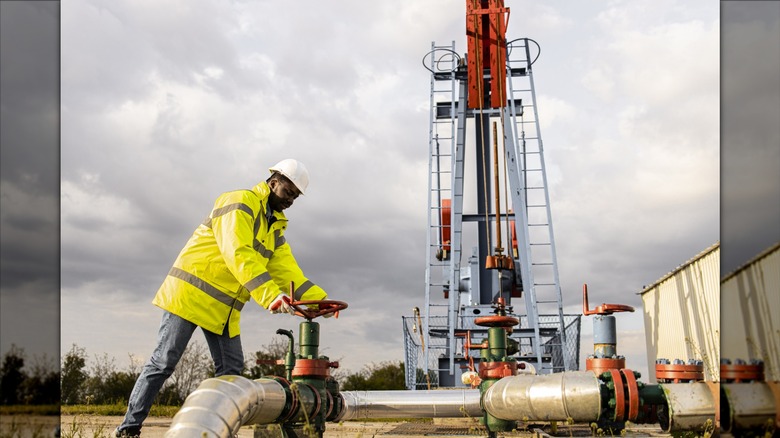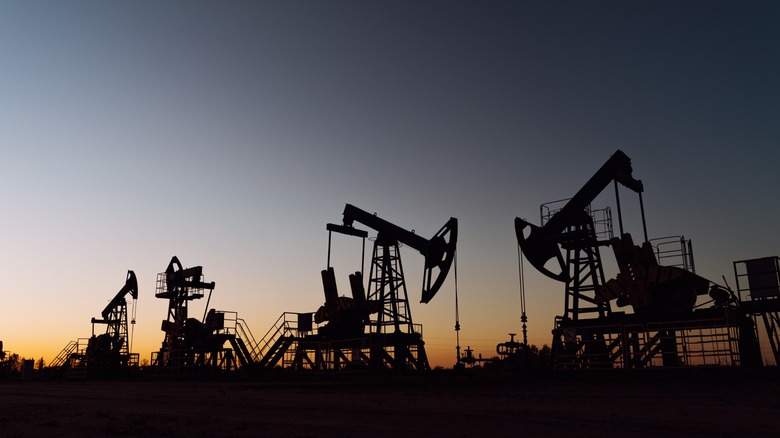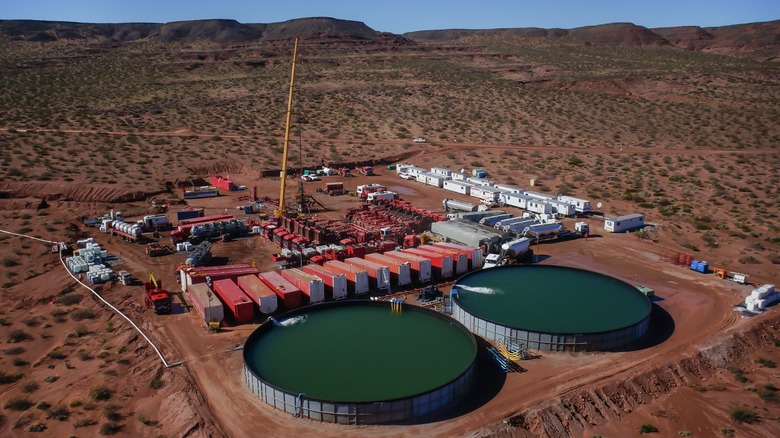What Is Fracking And How Did It Make Oil More Affordable?
Over the course of millions of years, heat and pressure can transform the organic remains of animals and plants into crude oil. That's why they're called a fossil fuels — the long-dead creatures that we now use to power our homes existed even before the dinosaurs and include unfathomable amounts of plankton and other ancient life. You might picture oil deposits as giant underground lakes, pools of thick black liquid scattered throughout the Earth's crust. However, natural oil reservoirs mostly don't exist in this manner. Instead, crude oil is found in smaller droplets embedded in rock.
When this rock is softer and more porous, like sandstone and limestone, removing oil from them is kind of like squeezing the water out of a soaked sponge. When that rock is harder and more dense, like shale, accessing its oil is closer to squeezing a brick instead of a sponge. Since this is a lot harder to do, energy companies use a process you've likely heard of — hydraulic fracturing, or, fracking — to remove the oil from this impermeable rock.
Fracking involves mining oil and natural gas by pumping massive amounts of a specialized fluid deep into the ground. This fluid, combined with intensive drilling and perforating the earth, creates fractures in the ground. Through these fractures, oil and natural gas that would otherwise remain trapped within the dense rock can then be collected. You won't be able to pour what's pulled from the ground directly into your engine as motor oil, because it needs to be filtered and refined first. Eventually, though, the byproduct will be used exactly the way traditional petroleum pumped from an oil drill will. Because fracking allows energy companies to mine more oil from the ground, basic supply and demand principles mean that oil becomes more affordable.
Fracking has become a common way to extract oil
Traditionally, oil companies sought out oil deposits in more porous rock, which was much easier and less expensive to drill for. The most accessible of these reservoirs were, naturally, many of the first to be tapped as the oil industry rapidly expanded, literally fueling the industrial revolution and the modernization of the entire world over the last two centuries.
It's becoming harder and more environmentally dangerous to find oil deposits that haven't been tapped and drained — especially as the energy demands of 21st-century civilization grow. This makes oil production — and thus oil itself — more expensive. In response, fracking was developed as a way to mine oil that isn't as easy to acquire as the petroleum found in softer stone. The process is more complicated and more expensive than more straightforward drilling, but with less and less "low-hanging fruit" deposits available, it's become a common way to extract oil, even if it's less cost-effective.
By 2022, two-thirds of all oil extracted in the U.S. was from hydraulic fracturing, and the industry is growing, especially with a pro-fracking administration currently running the government. About 95% of new oil wells are fracking-based. One of the common arguments for moving away from fossil fuels is that the supply of oil and natural gas, while abundant, is still finite. As the world looks to sustainable energy sources, the argument only grows stronger. Why go through all the steps of complicated hydraulic fracturing when wind and sunlight are available? The answer from energy companies that have been mining oil since the 1800s is that fracking for oil is still cheaper than these other options. This argument, however, may be flawed.
The hidden costs of fracking
While fracking may make oil more affordable and lead to short-term profits, the environmental impact of fracking may cost more in the long run — at least, this is the argument from opponents of fracking. For starters, fracking directly contributes to pollution, perhaps even more than traditional oil drilling. The fracking fluid that is pumped into the ground is mostly water — up to 97% — but also includes a cocktail of different chemicals and small solid particles called proppants. This not only uses up countless of gallons of clean water, but creates a ton of contaminated wastewater. If improperly stored, this wastewater can leak into natural water sources and soil. Some wastewater created by fracking also remains in the ground, leading to water in soil and homes that is unhealthy and potentially even flammable.
Fracking also hurts air quality by producing toxic compounds, which is one reason you should equip your home with indoor air sensors and purifiers. Methane is also released into the atmosphere, which is widely believed to contribute to climate change. Another negative effect hydraulic fracturing has on the environment isn't pollution, but natural disasters, as studies have shown that the wastewater disposal wells produced by fracking can cause earthquakes — even in the middle of the country, far from any major fault lines.
In the end, the damage caused by these after effects of fracking may end up costing more money than what's being saved by cheaper oil. It's up for debate whether or not it's too late to reverse climate change, but one step toward that goal may be not be making oil cheaper but instead replacing it altogether with renewable energy sources such as solar power.


